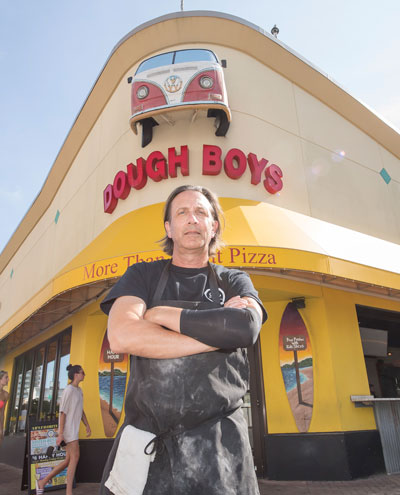The Great American Labor Shortage
Desperate employers, wary workers and big incentives
The Great American Labor Shortage
Desperate employers, wary workers and big incentives
At Dough Boy’s Pizza, summer typically brings a steady stream of job applicants seeking work at one of the restaurant’s three locations on the Virginia Beach Oceanfront.
But “this year, it’s next to nothing,” says owner George Kotarides. For Kotarides and other restaurant owners, a season that had been anticipated as the triumphant closing act of the COVID-19 pandemic has instead been an exhausting, stressful slog, as available workers have been scarce.
Kotarides has been in the restaurant business since he took his first job as a dishwasher in 1978. He’s seen challenging times before when the economy has taken turns, but nothing like the last several months. “Not even close,” he says. “It’s a daily challenge, and it’s very stressful for everybody.”
Due to a phenomenon some are calling the Great American Labor Shortage, businesses across Virginia both small and large are being forced to cut back on hours and services to stay open. For example, citing labor shortages, Kings Dominion amusement park in Doswell was open fewer hours (usually 11 a.m. to 7 p.m.) than usual this summer, and it closed some weekdays during June and August.

At Dough Boy’s, Kotarides has been closing his restaurants at 10 p.m. instead of midnight and changing menus and ordering processes to adapt to a staffing level that’s 35% lower than past summers.
Nevertheless, Kotarides emphasizes he’s not complaining — he’s thankful that he’s been able to make it through the summer staying open seven days a week. He’s watched as other restaurants have reduced days of operation or gone out of business altogether.
“People are working long shifts. It’s not easy. We jockey the schedule as much as we can to keep people from being overworked, but unfortunately that doesn’t always happen,” he says. “We are not asking for sympathy — just patience.”
September could be a turning point in the tight labor market that has plagued the post-pandemic recovery. But as employers and economists watch to see whether the Sept. 4 end of expanded federal unemployment benefits and a return to in-person school will lead more workers to fill open positions, one thing is becoming apparent: This isn’t 2019.
Whether you’re looking to hire a restaurant cook or a bank compliance officer, talent acquisition strategies have changed dramatically since the pandemic began.
John Asbury, president and CEO of Richmond-based Atlantic Union Bankshares, says the labor market in Virginia looks markedly different from employment recoveries he’s witnessed after past economic slumps. “The employment challenge in Virginia is less about the unemployment rate, and more about the ability of Virginia businesses to fill their open jobs,” he says.
Between February and April 2020, total nonfarm employment in Virginia dropped by 11.7% as the state’s economy shed 480,000 jobs during the pandemic’s initial shutdown. Unemployment in Virginia peaked during April 2020 at 11.3%. This June, it stood at 4.3% — still higher than the pre-pandemic rate of 2.5%.
This paradox of relatively high unemployment paired with record numbers of job openings means that many businesses are in a squeeze to find the workers they need.
In a June report by the National Federation of Independent Businesses, 46% of small-business owners reported having job openings they could not fill — more than double the historical average of 22%.

Douglas Parsons, executive director of the Front Royal/Warren County Economic Development Authority, says industrial employers in Warren were already seeking additional workers before the pandemic, and “when COVID hit, it just threw a wrench in everything.”
Parsons hears employers complain that expanded federal unemployment benefits have in some cases provided more money than people would earn working. “A lot of [unemployed] folks are saying that it’s not cost-effective for them to give up the benefits they are receiving from the government to come back to work,” he says.
But while many companies hope the end of expanded benefits in September will boost hiring at the lower end of the pay scale, labor experts say federal benefits aren’t the only variable at play, citing issues such as child care or concerns related to COVID-19.
Eric Terry, president of the Virginia Restaurant, Lodging and Travel Association, says that so far, his colleagues in states that opted to end expanded benefits early still aren’t seeing the influx of job applicants many had hoped for.
Pandemic power shift
Signs abound that the balance of power between workers and employers has shifted. Companies are advertising starting salaries in jobs postings and in some cases on big banners along major highways — information that previously would have been held close to the vest. And potential hires are seeking — and often getting — a degree of flexibility in where they live and how they work that very few would have dreamed possible before 2020.
In what’s being called the Great Resignation, increasing numbers of workers are jumping ship in search of more favorable working conditions.
In June, 3.9 million Americans quit their jobs — a rate of 2.7%. The so-called “quits rate” has been above 2.4% since February and in April it reached a record 2.8%, as nearly
4 million workers voluntarily left their jobs.
“The employee is in the catbird seat,” Parsons says.
This power shift is evident across all kinds of industries and jobs.
In July, 2,900 unionized workers at a Volvo Trucks plant in Dublin returned to work after negotiating a new hourly wage agreement, ending an on-and-off strike that began in April.

Large national retailers including Costco, Target and Amazon have announced wage increases in recent months. Those decisions have ripple effects for smaller businesses, forcing them to raise pay to keep up in a competitive hiring market. (And these higher labor costs are contributing to higher prices, with the U.S. Department of Labor reporting in July that consumer prices had risen 5.4% during the last year.)
“The pandemic forced us to rethink the entire relationship individuals have with work,” says Joseph Harder, an associate professor at the University of Virginia’s Darden School of Business. “It’s not just that white collar workers are demanding flexibility … but it’s also [happening with] the entry-level positions that are essential to reopening the economy. People are not working for minimum wage the way they once were. … I don’t know what would have shifted that power without the pandemic.”
“Agile” is the current buzzword among hiring professionals, as companies get creative about how to make employment offers appealing to the individuals they seek to hire.
“We are having to rethink the way we do things,” says Shawn Avery, president and CEO of the Hampton Roads Workforce Council. In addition to bonuses and higher wages, he says, businesses are finding they need to offer new or increased benefits, such as paid vacation time or funds toward education.

Further complicating the situation, the highly contagious delta variant of the coronavirus has caused a surge in COVID cases this summer, along with rising hospitalizations. This has employers grappling with issues such as whether to reinstate mask mandates or to require workers to get vaccinated, knowing that this could not only result in some employee terminations or resignations, but could also scare off potential hires.
Meanwhile, residual effects of the pandemic shutdowns — such as the pandemic-related suspension of the J-1 visa program, which brings many foreign workers to Virginia resorts and theme parks — still haven’t been completely resolved, further adding to worker shortages.
What’s the purpose of the office?
Office workers who have spent the past 18 months working remotely are now demanding flexible work options.
In a national survey conducted by Prudential Financial Inc. in March, 68% of respondents said having the ability to work a hybrid schedule is ideal. Of those who worked remotely during the pandemic, 87% reported that they wanted to continue working remotely at least one day per week.
Many companies had been planning for employees to return to offices after Labor Day, but those plans were disrupted by the delta variant surge. McLean-based Capital One Financial Corp. pushed back its plans to move remote employees to hybrid work schedules to Nov. 2 from Sept. 7. In Richmond, Genworth Financial delayed returning workers to the office until at least October.
As of early August, Atlantic Union Bank in Richmond was still uncertain whether it would move forward with its plans for a Sept. 7 return. But when that reopening does occur, CEO Asbury says, the bank’s employees will return to a hybrid schedule, with “collaboration days” where everyone will be on-site, coupled with options to work from home on other days.
“This is a great experiment,” Asbury says. “The only thing we can assure you of is that whatever we do will evolve based on our actual experience. If things continue to go well, there will be more flexibility. If we have challenges, there may be less flexibility.”
Loreen Lagatta, the bank’s chief human resources officer, says the ability to offer workplace flexibility has helped Atlantic Union stay competitive in what she calls the “war for talent.”
“The organizations that are listening to their employees, that are willing to test and learn and adapt, are the ones that are continuing to move forward,” she says.
This new world of work has created a national market for talent.
“There are plenty of companies that we would never have expected to have coming after our employees in Virginia, saying, ‘You can work from home,’” Atlantic Union’s Asbury says.

Although the bank wants most of its workers to be hybrid and not fully remote, Asbury says, the pandemic’s new work models have given Atlantic Union the flexibility to hire workers from other areas of the country for roles that can be performed remotely. “The truth is, we now have more people working in more states than we ever have before,” he says.
At Sentara Healthcare, Vice President for Recruitment and Workforce Planning Pat Evans says the pandemic proved to the health system that some employees in office-based positions could successfully do their jobs remotely. “That has been a change for us,” she says. “I don’t think we saw clearly that those could be done remotely before COVID.”
As office workers return, Evans says, Sentara is often able to honor their wishes for flexibility. “If we had a closed mind to that, that would have a negative impact on retention and recruitment,” she says.
Evans says overall hiring at Sentara is up about 50% this year, as the health care system has moved forward with hires that were put on hold during the pandemic, and as Sentara’s staffing needs have continued to grow.
“We are seeing lots of interested candidates, and we still need more,” she says. “We are doing more marketing in different ways to attract a broader applicant pool.”
This includes purchasing more sponsored posts on job sites, offering sign-on and referral bonuses and offering more flexible scheduling options where appropriate.
Vaccines: Mandate or encourage?
Amid these staffing challenges, employers are also wrestling with the question of whether to require employees to be vaccinated. In a mid-July survey of 59 Virginia CEOs conducted by the Virginia Council of CEOs and the University of Richmond’s Robins School of Business, only 10% reported that they would require vaccinations for their employees.
Since that survey was conducted, a lot has changed, though.
Gov. Ralph Northam announced that all state employees would be required to get vaccinated by Sept. 1 or be subject to weekly testing. Similarly, the Pentagon announced a vaccine mandate for U.S. military members. Several large private employers, including Walmart and Google, also announced workforce vaccine mandates.

Jason Malone, an associate professor at Virginia Tech’s Pamplin College of Business, says that as larger corporations take the lead in requiring vaccines in the workplace, smaller businesses will be watching the potential consequences to job recruitment and retention.
“These smaller to mid-sized businesses are more sensitive to the job market, and they could be impacted to a greater degree by a vaccine requirement,” he says. “By taking that hardline approach, you could alienate existing employees or potential future employees.”
Hospitality workers are scarce
At the onset of the pandemic, Virginia’s leisure and hospitality industry was particularly hard-hit, eliminating 204,800 jobs — 49% of the workforce — statewide between February and April 2020, according to data from the Virginia Employment Commission. By this June, leisure and hospitality employment in Virginia stood at 330,400 jobs — still 20% below its June 2019 level.
In June, there were still 88,000 job openings in restaurants and hotels in Virginia, according to the Bureau of Labor Statistics.
“It’s a nightmare,” says Dough Boy’s restaurateur Kotarides, who was shocked when he attended a job fair for hotel and restaurant jobs in Virginia Beach shortly before the July 4 holiday. Twenty-seven employers were represented and “zero applicants showed up,” he says.
Dough Boy’s has raised wages by 35% in the past 12 months, and added benefits such as discounted insurance, free meals and quick promotion opportunities. “We are keeping people. We are thankful for that,” he says. “But people just aren’t walking in the door or applying like they normally would.”
Kotarides is interested to see whether hiring picks up after expanded unemployment benefits expire Sept. 4 — but notes that it will come too late for the tourism-related businesses that needed staff all summer.
Avery says many restaurant owners and managers are working double shifts, leaving them little to no time to recruit, train or interview new workers.

VRLTA’s Terry is hearing that the hiring situation is improving in some regions for servers and hosting jobs, but cooks, dishwashers and other back-of-the house positions remain difficult to fill. One in-state restaurant chain had to temporarily relocate employees from Richmond and put them up in hotels so that there would be enough labor to operate their Harrisonburg location, he says.
Hotels continue to struggle to find enough staff, and Terry says one permanent casualty of the pandemic staffing crunch may be that daily hotel room cleaning becomes a relic of the past. “I don’t know if you’re going to see that change for a while,” he says.
Calling the situation a “workforce crisis,” the city of Virginia Beach appropriated $400,000 to the Hampton Roads Workforce Council in July for a program that will pay $1,000 bonuses to up to 250 employees to entice them to take jobs in the tourism industry. Another $100,000 will go into a marketing program targeting potential applicants, and $50,000 will be spent on administration and research to determine why people aren’t returning to these jobs.
In early June, Northam announced that the state was launching a similar worker incentivization effort, the Virginia Return to Earn grant program. The state planned to invest $3 million to provide qualifying small businesses with matching funds to award new employees up to $1,000 signing bonuses.
Gone for good?
In a national study conducted this spring by job search site Joblist, 38% of former hospitality workers reported that they would not consider a hospitality job for their next position. More than half of these workers indicated that no pay increase or incentive would lure them back to their old jobs.

Vinod Agarwal studies the hospitality industry as a professor at Old Dominion University’s Dragas Center for Economic Analysis and Policy. The pandemic was a source of “creative destruction” for the industry, he says, because workers “got time to start thinking about what they wanted to do.”
Coming out of the crisis, businesses will need to be proactive in hiring and retaining workers, he adds. Employers need to think about not only compensating employees but also supporting them as individuals whose lives don’t stop when they clock out of work.
“Were you able to take care of your employees when they needed help? If you didn’t, they aren’t coming back,” Agarwal says. “Wages alone may not do the job.”
Taking care of employees beyond the paycheck has proven successful for Jay Patel, who owns three Edible Arrangements franchises in Hampton Roads and a handful of restaurant franchises on Naval Station Norfolk.
To maintain staffing for a 130% increase in business his Edible Arrangements stores experienced in 2020, Patel successfully sought a temporary change in company policy to allow parents to bring their children to work with them. He upgraded his Wi-Fi so that children could attend virtual classes at the stores and instituted a “hero bonus” raise of $2 per hour for all employees. He’s helped employees get needed car repairs and assisted them in locating affordable housing. These practices grew employee loyalty and have gotten him through the pandemic with minimal staffing challenges, he says.

Caren Merrick, CEO of the Virginia Ready Initiative, says former hospitality workers make up about 12.5% of the 2,000 people who have enrolled in its Virginia Ready Scholars program to train for new careers. It’s the second-most represented industry in the program, behind health care. But health care workers are typically seeking increased training for their jobs, she says, while most hospitality workers in the program say they’re leaving their industry altogether.
Virginia Ready Scholars is a partnership among 24 private businesses and the Virginia Community College System. It places participants in one of 34 selected training programs for high-demand skilled industries and offers a $1,000 award and job interview opportunities upon completion.
“These are individuals who would have stayed [in the hospitality industry] for the rest of their career, but because they were forced to take time off, they got to reflect,” Merrick says. “They want more upward mobility. They want training. They want some flexibility.”
Shutdown brought breaking point
Katherine Bray, a 26-year-old single mother in Fredericksburg, was working at a direct mail business when the pandemic hit.
As the volume of political mail increased drastically ahead of the 2020 presidential election, she says, her employer was reluctant to add new workers out of concern of COVID-19 exposure. Bray found herself working up to 60 hours a week.
This put pressure on the child care arrangement she had with her landlord, as her oldest child’s virtual kindergarten classes were proving too much to manage around work.
“We stuck it out as long as we could,” says Bray. “I was constantly putting in applications looking for a work-at-home position.”
Bray, who had previously worked for fast food restaurants, big-box retail stores and call centers, had always known she’d need more education to land the jobs she wanted. Taking classes always seemed like too much to take on — until the pandemic.
Bray called the career and transfer services office at Germanna Community College in December 2020. As a single mother, she qualified for financial aid, she discovered, so she enrolled in classes to earn her associate degree in business management, along with four business certifications.
After her employer denied her request to reduce her weekly schedule to 30 hours so she could take classes, Bray quit her job. “I didn’t have anything else lined up, but I knew that my household could not continue the way it had been,” she says.
When she emailed the college seeking referrals for jobs she could apply for, Germanna offered her a work-study position. She now works 20 hours a week in a job that can be done partly from home while taking classes toward her degree. She pays for fewer hours of child care and feels positive about her career path.
Marie Hawley, Germanna’s coordinator of career and transfer services, says Bray’s story is representative of an increased interest in careers that have remote options and won’t be eliminated if another pandemic hits.
“Students have a strong lack of interest to work in an environment that is subject to working with the public through another pandemic,” she says. “Most are not interested in any front-facing customer services jobs.”
Banks are seeing a similar dynamic in hiring for teller positions.
“In the wake of the pandemic … what I hear a lot of banks say is that staffing their branches has been a real challenge,” says Bruce Whitehurst, president and CEO of the Virginia Banking Association.
Amy Mellinger, senior vice president and director of human resources for Powell Valley National Bank in far Southwest Virginia, says the bank, which has around 90 employees, saw nine resignations this year as of July.
“Every single one was an entry-level teller position,” Mellinger says. But the bank hasn’t had trouble filling the jobs, and new hires have come from the medical and restaurant industries.
“The last entry-level position we hired, the teller had been in the restaurant industry, at the same restaurant for 13 years,” Mellinger says. “She was ready for a change, different hours and a different career path.”
Something different
The great career rethink was a pandemic pastime for many workers.
In a January 2021 Pew Research Center survey, two-thirds of unemployed adults said they had seriously considered changing their occupation. One-third reported taking steps to gain new skills.
After being laid off from his job in electrical sales in spring 2020, Powhatan resident James Sayles was able to take a breather for a few months, due in part to expanded federal unemployment benefits.
Truck driving had always been on his career wish list, and he started looking at what credentials he’d need. Sayles was able to complete commercial driving training for tractor trailer trucks at John Tyler Community College for only $500 out-of-pocket after qualifying for a grant for Virginia residents and a $1,000 Virginia Ready scholarship.

Virginia Ready’s Merrick says the commercial driver’s license is the No. 1 enrolled credential among the program’s 2,000 enrolled participants.
Making a complete career change at age 51 has given Sayles confidence that he’ll be able to weather future changes in the economy, and he enjoys the freedom and independence of truck driving.
Dale Bennett, president & CEO of the Virginia Trucking Association, would like to hear more stories like that. The trucking industry anticipates a nationwide need for 1.1 million new drivers over the next 10 years, due to rising demand and an aging workforce. Additionally, Bennett says, truck driver training schools and DMV offices were shut down during the pandemic, slowing the onboarding process for new drivers.
Bennett says carriers are raising pay, offering signing bonuses as high as $10,000, and hiring drivers while they are still in training to keep their numbers up.
“We also feel good that during the pandemic, the general public got an understanding for what truck drivers mean to their everyday life,” he says. “Retail store personnel were constantly getting the question, ‘When is the next truck coming?’ It should have been, ‘When is the next driver coming?’”
A greater sense of purpose and work-life compatibility are key to recruiting in the post-pandemic market, U.Va.’s Harder says.
“The strategic question is, ‘Who are the people I absolutely cannot afford to lose?’ Go make sure they are happy enough that you don’t lose them.”






















